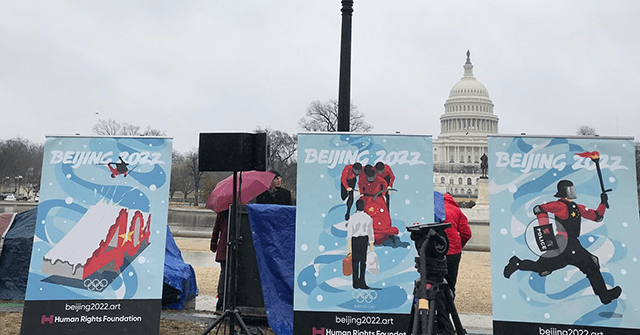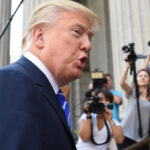Famed Chinese dissident artist Badiucao reported on Friday that satirical posters he created to lampoon the Beijing Winter Olympics were banned at George Washington University (GWU), ostensibly because the Chinese artist is guilty of “racism.”
After a weekend of intense focus from human rights organizations, the university backed down on its threat to remove the posters and punish the students who displayed them.
1/ @GWtweets George Washington University Chinese Students and Scholars Association (GWUCSSA) is launching a witch-hunt to the student activists puting my boycott #beijing2022 posters in campus.
A classic smear campaign to cancel criticism against CCP via calling it “racism”. pic.twitter.com/Z7OFIEgWB5
— 巴丢草 Badiucao💉💉 (@badiucao) February 5, 2022
Badiucao made a point of displaying the full set of posters deemed “racist” and insulting to the “Chinese nation” – which are two very, very different concepts, although the tyrannical Chinese Communist Party naturally wishes to be seen as synonymous with the Chinese people:
2/ The collection posted in @GWtweets includes 5 posters depicting CCP’s
1. Oppression of the Tibetans
2. Uyghur genocide
3. The dismantling of HK democracy
4. The regime’s omnipresent surveillance systems
5. lack of transparency surrounding the COVID-19 pandemic. pic.twitter.com/ITIBiryf4X— 巴丢草 Badiucao💉💉 (@badiucao) February 5, 2022
The artist expressed pride in seeing his Olympic posters taken up as symbols of protest from activists for the oppressed Uyghur Muslims and Tibetans, as well as the brutally suppressed pro-democracy movement in Hong Kong.
Badiucao said it was “misleading and ignorant” to call his art “anti-China” or “racist,” given that he is Chinese himself. He said he was the target of a “witch hunt” and a “Chinese Communist Party smear campaign.”
The complaint from the Chinese Students and Scholars Association (CSSA) against Badiucao’s artwork charged students hanging the posters around campus with perpetrating “extremely vicious personal attacks on all international students from China and Asian groups” – as if the Chinese Communist Party was not only the avatar of all Chinese people, but somehow represented every Asian in the world.
The student union letter called for a “public apology” from those hanging the posters, and then threatened to “punish them severely.”
On Sunday, Badiucao posted an email from George Washington University President Mark S. Wrighton in which he endorsed the censorship demands and declared himself “personally offended” by the posters and “saddened” by the “terrible event” of students hanging them on campus.
“We are working to have all of these offensive posters removed as soon as possible … We will undertake an effort to determine who is responsible,” Wrighton pledged to the complaining student union.
Badiucao said he contacted Wrighton and asked him to explain “why exposing the Chinese Communist Party’s abuse frightens him.”
Observing this exchange between the dissident artist and the university administration, Sen. Marco Rubio (R-FL) observed that “many American universities are enthusiastic agents for China’s censorship efforts in America.”
The disturbing relationships between American universities and the Chinese government are explored in depth in Peter Schweizer’s book Red-Handed: How American Elites Get Rich Helping China Win.
As the book explains, the Chinese Communist Party uses both direct donations to American schools, and economic leverage gained from gigantic university trusts making big investments in China, to influence American university administrators.
After years of intense criticism, George Washington University closed its Confucius Institute in July 2021. Confucius Institutes were presented as innocuous programs for teaching Chinese language and culture to students around the world, but critics say they were instruments for spreading Chinese Communist propaganda and keeping Chinese students under firm ideological control when studying abroad.
China is also notorious for using student organizations to influence American university administrators and maintain surveillance on Chinese youth studying in the United States. The Chinese Students and Scholars Association at George Washington University was specifically cited as such an instrument of Communist control in a 2018 Foreign Policy article.
The Foundation for Individual Rights in Education (FIRE) said on Sunday it was “deeply concerned” by reports that President Wrighton planned to “unmask the student(s) who posted artwork criticizing the Beijing 2022 Olympics and China’s human rights record.”
“If accurate, this pledge to root out anonymous speakers who criticize foreign governments is a wholly inappropriate response by an American university purportedly committed to free expression. Censorship may be welcome at the Beijing Olympics, but it doesn’t belong on campus,” FIRE said.
The George Washington University controversy also caught the attention of Human Rights Watch China Director Sophie Richardson:
Why is @GWtweets @PresWrightonGW supporting suppression of #academicfreedom?!? Seemingly failing to take up utterly uni-appropriate offer of debate from @badiucao? On syllabus: https://t.co/yoYdymepu0
andhttps://t.co/WP979TZhtl @hrw_chinese @Yaqiu @Sophiemcneill pic.twitter.com/Rzxvapyq1e— Sophie Richardson (@SophieHRW) February 7, 2022
On Monday, GWU President Wrighton wrote an open letter to the university community, apologizing for misunderstanding the situation and rescinding his threat to eliminate the Badiucao posters and punish those who displayed them:
Last week, the university learned of posters on campus depicting images that alarmed some members of our community, and we began to receive a number of concerns through official university reporting channels that cited bias and racism against the Chinese community. I also received an email directly from a student who expressed concerns.
At that time, and without more context on the origin or intent of the posters, I responded hastily to the student, writing that I, too, was concerned. University staff also responded to ensure the posters were removed. These responses were mistakes. Every member of the GW community should feel welcome and supported, but I should have taken more time to understand the entire situation before commenting.
I have since learned from our university’s scholars that the posters were designed by a Chinese-Australian artist, Badiucao, and they are a critique of China’s policies. Upon full understanding, I do not view these posters as racist; they are political statements. There is no university investigation underway, and the university will not take any action against the students who displayed the posters.
“I want to be very clear: I support freedom of speech – even when it offends people – and creative art is a valued way to communicate on important societal issues,” Wrighton insisted, which is very difficult to square with how he immediately declared himself personally offended by the posters and promised to not only censor them, but take action against those who displayed them, after receiving a handful of complaints from the Chinese student union.
Badiucao’s satirical Olympic posters were created as part of a program called “Art in Protest” and were meant to be sold as NFTs, with collectors given the option of adding messages critical of the authoritarian Chinese government to the blockchains as a “decentralized record of protest.”
“I have been battling censorship from China’s authoritarian regime for more than 10 years. When conventional galleries and venues are too intimidated to exhibit my art due to threats from Beijing, the Internet has been the last resort for artists like me,” Badiucao said when debuting the collection.
The Chinese government attempted to shut down a December exhibition of the Olympic posters in Brescia, Italy, but the mayor of Brescia refused China’s demands for censorship.






